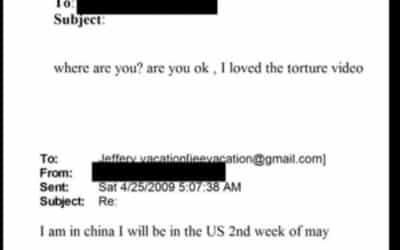“Don’t do it son,” big George Foreman said as he shielded his commentary partners, Larry Merchant and Jim Lampley from violent rioters. The conclusion of the first Andrew Golota vs Riddick Bowe fight had ended in controversy which led to brawls and a ringside riot. It was with a commanding presence earned from years as a prize fighter, the best in the world, two time champion and a man who overcame great odds that kept those nearby safe. By then a millionaire, comfortable and forty-seven years of age. He could have run, cowered but instead he stood firm and protected his friends and others from a mob of lunatics who used the controversial end of a boxing match to spread violence.
There have been many tributes celebrating the late, great champion, so I don’t need to talk about him winning an Olympic gold medal or the menace imposed by him during his first career as one of the greats of 1970s heavyweight boxing. His destruction of greats like Frazier and Norton, to lose his belt to Muhammad Ali. The bitterness he exhibited over losing his title, fighting five men in one night in Toronto to prove a point in doing so losing the respect of boxing fans only to earn it back, in a war with Ron Lyle and walking away from the sport in 1977 after a close loss to Jimmy Young.
In his retirement he was a family man and a preacher, an important pillar within his community. In 1987, a decade after retiring he began a comeback at thirty-eight years young. At first it was to raise money for his youth training centre, where he coached and gave kids an outlet through sports. No one took his comeback seriously, at first it was seen as a novelty. He fought journeymen and stopped them, then he ran through men like Bert Cooper who was hot and cold and slugging it out with Dwight Qawi. Then Foreman stopped in two rounds a returning Gerry Cooney followed by an impressive knock out win over top ten contender Adilson Rodriques. Now the boxing world took him seriously.
By 1991, Mike Tyson had lost his title to Buster Douglas and Evander Holyfield had by then defeated the new champ. At Forty-Two, Foreman challenged the much younger champion in a tough battle where he lost the decision but earned greater respect. Holyfield was too young, too good. Foreman continued his campaign and fought tough opposition, in 1993 he fought Tommy Morrison for a slither of the heavyweight title. Again he lost the decision. Then the new champion, Michael Moorer fresh from his close win over Holyfield needed an opponent. The forty-five year old George Foreman climbed through the ropes and fought for the world title again.
“…it happened, it happened.”
Michael Moorer was knocked out in the tenth. Foreman wearing the very trunks that he had lost the title in, twenty years prior was now the new and oldest heavyweight champion of the world. Foreman would fight on until he was forty-eight, losing the lineal title to then up and comer, Shannon Briggs in a controversial decision. By then Foreman had become an advertiser friendly icon, a witty man who gave a good interview. A contrast to his Sonny Liston inspired brooding public persona from his first career. His faith and love of God was ever apparent in his life, though he never imposed while a media celebrity. Instead he set examples.
During his second career, he would hold back and let opponents off after landing powerful shots. He could be a brutal puncher, a menace who would occasionally go low or frame hard with his elbows though this was the Archie Moore methods he had been schooled in. He had control and accuracy, timing and besides his ferocious power, he was a tactician with skills that go unnoticed by those who see him as a force of nature rather than a ring general. His ability to mix linear and round punches, long and short, his walking uppercut to the cross arm defence married with his grappling skills were all once in a century traits. A package of skills that had became drowned out by his power and strength.
Despite his soft exterior during his second career, there was still that ferocity and maybe the temper of a man who cultivated his rage into boxing ability. Those who were present during the comeback years mention his fury on the bag and even frustrations during sparring and training. Anyone who has been in a fight camp or inside those moments get it. Those on the outside may not understand the relationship between anger, and violent focus. He was a man who with such experience, discipline and ability displayed a deep mercy and understanding about the power of compassion, even during a prize fight.
During the Oliver McCall vs Lennox Lewis rematch, when McCall went into a melt down that seemed to be more about his outside life rather than what was happening during the fight. It was Foreman while commentating who expressed an empathy for McCall, a man that he could see was going through turmoil. It was a merciful side that came through while the crowd booed and the other commentators were more concerned with McCall’s unprofessional performance. Foreman saw a human being in pain.
George Foreman will be remembered as a great, the larger than life character that became a reality television star, showman, salesman, comedian, broadcaster. He was a champion and one of the best boxers in history. As a man he was an inspiration, “age is just a number.”
He proved that.
As a man and a professional fighter, George Foreman exemplified primal violence, a ferocity that was already inside of him via birth and circumstances. With discipline, study and hard work he cultivated it and mastered his craft and himself. Foreman always fought, he always came to fight and he would always get back up to his feet.
Foreman once said, “boxing is like jazz, the better it is then the less it is appreciated it.” If he was a jazzman, then he would have been more of a Clifford Brown, a man who showed you could be clean and lead a good life while being a great musician rather than a surly, Miles Davis. Maybe in his youth, Foreman was more like Davis and found that peace to be a better man through defeat, and loss.
In this age of bluster, rizz and show boating, a man like George Foreman is a relic from when dignity reigned. One can be great, powerful and dominate other men in combat and still show mercy, compassion while expressing sincere empathy. That is strength. For me, this was Foreman’s greatest lesson, as both a man and a professional fighter. Thank you, from the young man I once was who grew up during the comeback years and poured over the pages and hours of video tape from the younger years. And now as an older man, thank you for inspiring me to stay in shape and work hard regardless of age, to retain discipline and dignity. Rest in Peace.
































